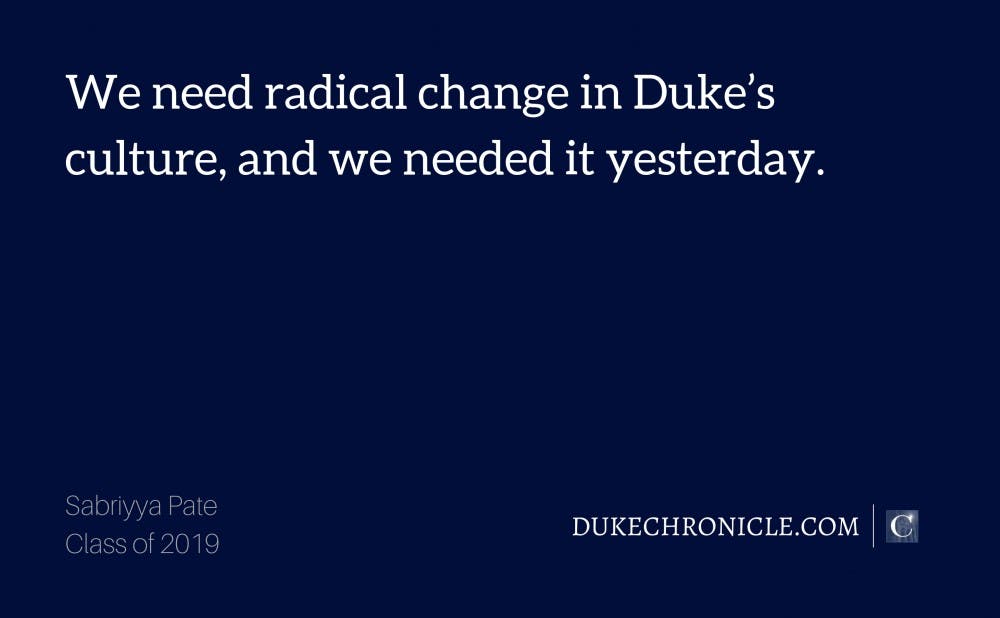I have lived a Duke haunted by both a coyly expressed frustration with the lack of residential community for all students, and the prominence of exclusive groups granted housing privileges. Selective housing precludes all-encompassing residential houses wherein a grounded parity may be nurtured by intentional programmatic efforts.
My ideal housing model guarantees on campus housing for four years, retains a first-year-only campus, and shuffles first-years into randomly comprised houses on West Campus. All houses would have an identity the members define for themselves, distinct traditions, the capacity to host on-campus parties, and not be permitted to exclude students from entering said parties.
At Duke, while students find community in an array of co-curriculars and even academic pursuits, the fact remains: the current residential house model with housing privileges reserved for selective groups is toxic. The model undermines the very principles of an inclusive and diverse undergraduate experience.
As a resident assistant (RA), these issues have been particularly salient in my Duke life. I often hear students call Kilgo Quad, where I have worked as a RA for three years, the “perfect” dorm. We have a history of high performance on the annual Resident Feedback Survey sent to students in October, conveniently after RAs are mandated to host six programs in the first six weeks of the semester. Struggling with the burden of their own adjustment to the semester, RAs put their needs aside to perform this emotional labor.
Kilgo is also known for the RA-hosted monthly “Sunday Sundae” series, which brings together residents of the quad for a waffle sundae buffet. In spite of such programmatic innovations, which have taken off across West Campus, there is a concrete obstacle to community-building in independent houses: selective housing. There will never be parity in our housing model as long as certain students are allowed to exclude their peers from housing.
I say this as a student who joined a selective living group my freshman year and as an RA in an active independent house named Avalon. Students come to Sundae Sunday alone or in their friend clusters, and leave as such. My best attempts to socialize and introduce students to one another have borne few friendships. “Kilgo Rush,” a month of all-inclusive events to celebrate the Kilgo community amidst the selective group recruitment season, is a temporary symbolic fix to a deeper institutional-level issue.
At the start of the 2018-19 academic year, half the Kilgo team was filled with RAs who had not lived there before; some were new juniors coming out of isolating experiences as sophomores on West. We have had our fair share of team arguments rooted in frustration over cleaning the waffle iron or how some people were not showing up to Sundae Sunday shifts. We are far, far from perfect, if such a thing exists. Idealized coverage of our community has masked unfortunate realities. Housing and Residence Life’s expectation that RAs ensure every student feels like they are accepted and belong in their residential house, in as structurally divisive a place as Duke, is beyond lofty.
I have had a sense that upperclassmen on West Campus, once graduated from the first-year campus where RA-resident relationships tend to be stronger, would rather hide in their rooms than be spotted at an RA program. Do not get me wrong, RAs do their jobs. My role as an RA has been one of my most fulfilling and meaningful experiences as student leader. Still, what the University asks of independent house RAs is unattainable insofar as selectiving living arrangements endure.
Founding Duke Students for Housing Reform (DS4HR) altered the course of my personal development. Through DS4HR I organized panels and roundtables with a diversity of students who spoke to their dissatisfaction. In fact, the founding group of DS4HR included several members of Greek organizations. Still, there is a strong taboo against articulating these sentiments. This is all to say that I know this issue well—I have talked to hundreds of students about their dissatisfaction with the Duke residential experience.
We need radical change in Duke’s culture, and we needed it yesterday.
My hope is that one day, Duke’s social culture will mirror that of a liberal arts college with no selective life presence and greater respectful and productive exchanges between all students, with no barriers to communication at all. One of my best friends is a senior at Davidson College. Each time I visit her, I leave wishing I had applied to her school, where no student groups have selective housing and where social events (that all tend to safely occur on campus) are open.
Future generations of Duke students do not need to experience the exclusive, convoluted, monopolistic, and alienating social experience that so many of us are unable or afraid to call out.
We, alone, are the caretakers of the pens that write our destinies. Culture change begins and ends with brutal honesty at the individual level. As I leave campus an alumna, I carry utmost trust in the Duke students who will drive this change forward.
Sabriyya Pate is Trinity ‘19 and a former Chronicle columnist. All views expressed are her own and are not intended to represent any group she is a member of.
Get The Chronicle straight to your inbox
Signup for our weekly newsletter. Cancel at any time.
Sabriyya Pate is a Trinity junior. Her column runs on alternate Mondays.

